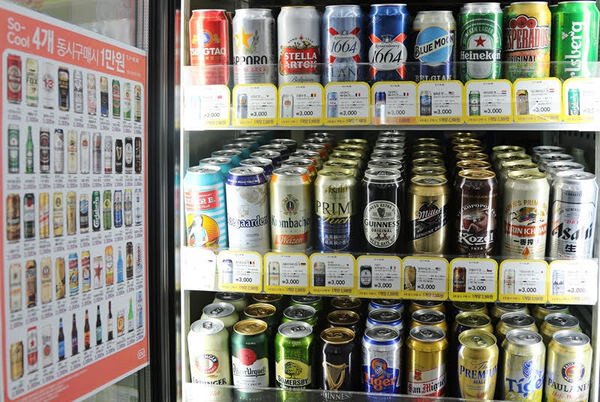hankyoreh
Links to other country sites 다른 나라 사이트 링크
S. Korean consumers boycott Japanese products

A boycott of Japanese products by South Korean consumers is having visible effects.
According to figures released on July 8 by the convenience store chain GS25, sales of Asahi, Kirin, and other imported Japanese beers for the period July 3–7 were down 23.7% from the previous week. Overall sales of all beer, however, increased by 1.2% over the same period. With Japanese beer sales falling slightly by 1.2% on July 3–4, the numbers suggested a large drop in sales over the weekend dates from July 5 to 7. As a result, Asahi slipped to second place as the market share for its large 500ml cans dropped from 13.3% (first place) to 10.0%.
In the case of the CU convenience store chain, total beer sales for the period July 1–7 were up by 2.6% from the week before, while Japanese beer sales fell by around 11.6%. At CU as well, Asahi slipped from first to third in sales, being overtaken by Tsingtao (second to first) and Heineken (third to second). Total beer sales at 7-Eleven convenience stores rose by 1.9% over the same period, while Japanese beer sales slipped by around 9.2%.
A similarly sharp decline in Japanese beer sales was also seen at supermarkets. At Lotte Mart, Japanese beer sales fell by 10.4% for the period July 1–7 – a much steeper rate than the 2.9% decline observed for all imported beer sales. At e-mart stores, imported beer sales rose by 2.9% during the same period, while Japanese beer sales tumbled by 14.3%. The phenomenon – with Japanese beer sales alone experiencing double-digit slides even as overall beer sales rise slightly amid the hotter summer weather – is being attributed to a boycott against Japanese products in the wake of the Japanese government’s export controls on key semiconductor and display materials.
“There have been boycotts of Japanese products in the past whenever South Korea-Japan relations have soured, but they never had that great an impact,” said one industry source.
“It appears that the effects of the boycott this time have been far faster and more apparent because it’s a case of direct economic controls,” the source suggested.
Some analysts are suggesting that boycott’s ripple effects could increase as some retails declare outright halts to their sales of Japanese products. The Korean Federation of Small and Medium Business has announced plans to return all Japanese cigarettes and beer at member stores, while the Korea Supermarkets Alliance has said it will participate in the boycott of Japanese products.
By Hyun So-eun, staff reporter
Please direct comments or questions to [english@hani.co.kr]

Editorial・opinion
![[Column] Park Geun-hye déjà vu in Yoon Suk-yeol [Column] Park Geun-hye déjà vu in Yoon Suk-yeol](https://flexible.img.hani.co.kr/flexible/normal/500/300/imgdb/original/2024/0424/651713945113788.jpg) [Column] Park Geun-hye déjà vu in Yoon Suk-yeol
[Column] Park Geun-hye déjà vu in Yoon Suk-yeol![[Editorial] New weight of N. Korea’s nuclear threats makes dialogue all the more urgent [Editorial] New weight of N. Korea’s nuclear threats makes dialogue all the more urgent](https://flexible.img.hani.co.kr/flexible/normal/500/300/imgdb/original/2024/0424/7317139454662664.jpg) [Editorial] New weight of N. Korea’s nuclear threats makes dialogue all the more urgent
[Editorial] New weight of N. Korea’s nuclear threats makes dialogue all the more urgent- [Guest essay] The real reason Korea’s new right wants to dub Rhee a founding father
- [Column] ‘Choson’: Is it time we start referring to N. Korea in its own terms?
- [Editorial] Japan’s rewriting of history with Korea has gone too far
- [Column] The president’s questionable capacity for dialogue
- [Column] Are chaebol firms just pizza pies for families to divvy up as they please?
- [Column] Has Korea, too, crossed the Rubicon on China?
- [Correspondent’s column] In Japan’s alliance with US, echoes of its past alliances with UK
- [Editorial] Does Yoon think the Korean public is wrong?
Most viewed articles
- 1‘We must say no’: Seoul defense chief on Korean, USFK involvement in hypothetical Taiwan crisis
- 2Will NewJeans end up collateral damage in internal feud at K-pop juggernaut Hybe?
- 3[Column] Park Geun-hye déjà vu in Yoon Suk-yeol
- 4Why Korea shouldn’t welcome Japan’s newly beefed up defense cooperation with US
- 5Thursday to mark start of resignations by senior doctors amid standoff with government
- 6N. Korean hackers breached 10 defense contractors in South for months, police say
- 7[Guest essay] The real reason Korea’s new right wants to dub Rhee a founding father
- 8[Column] ‘Choson’: Is it time we start referring to N. Korea in its own terms?
- 9Kim Jong-un expressed ‘satisfaction’ with nuclear counterstrike drill directed at South
- 10[Editorial] New weight of N. Korea’s nuclear threats makes dialogue all the more urgent